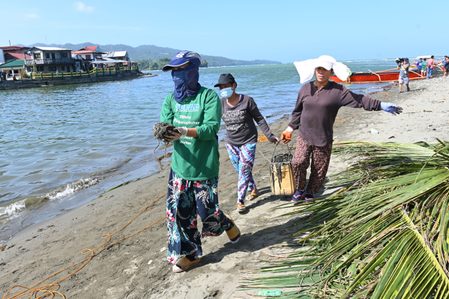SUMMARY
This is AI generated summarization, which may have errors. For context, always refer to the full article.
![[OPINION] Oil spill at Verde Island Passage: More peril in Amazon of the Oceans](https://www.rappler.com/tachyon/2023/03/ispeak-verdeisland-oil-spill.jpg)
On February 28, a fuel tanker carrying 800,000 liters of industrial fuel capsized in the waters of the Verde Island Passage (VIP), a globally-important marine seascape known as the “Amazon of the Oceans.” The oil spill reached the coastal shores of Oriental Mindoro by March 3 and is continuing to spread to other coastal areas beyond the originally predicted maximum radius. Pola, Oriental Mindoro Mayor Jennifer Cruz declared a state of calamity as dead marine life and foul-smelling oil sludge started to wash ashore. Oriental Mindoro has declared a state of calamity in nearly 80 other coastal towns in the province.
As a Negrosanon, this event seems all too familiar. Western Visayas has a collective memory of the Guimaras Strait oil spill in 2006 – the worst recorded in the Philippines. Petron, the country’s largest oil refining company, owned the oil tanker that sank and spilled more than 2.1 million liters of bunker fuel that painted the island paradise of Guimaras black.
The elementary school I was in organized a haircut drive as part of a nationwide initiative to gather enough hair to be donated to Guimaras to aid in getting the oil out of its waters. Human hair was found to be the most absorbent material for oil spills, and it was a widely-available, organic, and accessible resource. I vividly remember my younger self lining up for my haircut, feeling a little proud to have helped, thinking that a few inches of my hair would save the ocean.
Of course, all the efforts could only do so much amidst sudden critical damage to biodiversity and ecosystems. The mangroves only started recovering more than a decade later. The coral reefs were in much worse conditions. Fish stock lowered drastically, causing the prices of fish to go up. Until today, the people and the waters are still reeling from the lingering impacts of the oil spill. This disaster left its imprint not just on the environment and the economy, but also on collective memory.
Today, the provinces of Oriental Mindoro and – currently to a less yet equally unfortunate extent – Antique are forced to face this similarly traumatizing environmental disaster and its devastating impacts.
The oil spill in Verde Island Passage spells out peril for millions of Filipinos dependent on its waters. It is one of the biggest fishing grounds in the Philippines, providing livelihood to 18,000 fisherfolk in Oriental Mindoro alone, and supplying marine produce to over two million people in the country. The oil spill is expected to impact 36,000 hectares of mangroves, coral reefs, and seagrasses, according to the UP Marine Science Institute. The impending destruction of these ecosystems will bring about worsened environmental and economic conditions for thousands of residents in the province.
VIP is home to abundant species of corals, seagrass, shorefish, sea turtles, and marine mammals – making it the most biodiverse marine habitat in the world. It remains resilient despite widespread coral bleaching and is found to be the most productive marine ecosystem globally. The wide coverage of reefs and mangrove forests also makes it a critical carbon sink that sequesters greenhouse gas emissions, mitigating the worsening impacts of the climate crisis. VIP has 54 marine protected areas, with environmental groups lobbying to get the rest of its waters declared as a protected seascape and a UNESCO World Heritage Site.
This is what we are set to lose not just as a country, but also as a global community.
Marine ecosystems serve as our life source and as natural climate solutions. Its devastation is a story that will continue to unfold unless our national and global leaders pursue radical solutions aligned with the urgency of the crisis. Oil spills like these are not “accidents” or isolated cases, these are recognized risks that are part and parcel of the dirty business of the fossil fuel industry, which has single-handedly decided to make our reefs and communities their collateral damage in pursuit of unimaginable profit.
With the Philippines as one of the most vulnerable countries to the climate crisis in the entire world, the conservation of biodiversity hotspots like VIP is imperative to protecting our environment and communities from further loss and damage. The fossil fuel industry comprised of coal, oil, and gas is the biggest culprit to this global climate catastrophe, but they are also deep inside the pockets of leaders across the globe. Here in the Philippines, it is no different. What happens to the thousands of fisherfolk, and the millions of Filipinos dependent on its marine bounty?
Whether these are oil spills, destructive infrastructures, and dirty energy projects, the widespread climate collapse is not something that a mere haircut drive can solve. At the rate we’re going for such a massive crisis, you’d expect our leaders to act with urgency and phase out the industries responsible for destroying our reefs — but they seem to be doing less than preschoolers lining up for a snip. – Rappler.com
Krishna Ariola is a climate and energy campaigner at the Center for Energy, Ecology, and Development and the co-founder of Youth for Climate Hope in Negros Occidental.
Add a comment
How does this make you feel?

There are no comments yet. Add your comment to start the conversation.